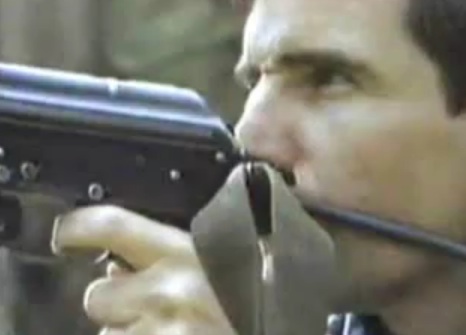This federal election is turning into a quagmire for Michael Ignatieff and the Liberals. Part of their trouble may be a result of their leader’s unstinting support for NATO’s quagmire in Afghanistan.
Columnist Chantal Hebert has identified the party’s support for extending the presence of Canadian troops until 2014 as a key turning point: “After the Afghan decision, Quebec lost interest in the Liberals.” As the NDP surge looks set to reshape Quebec politics forever, and as the social democrats surge past the Liberals in Canada-wide polls, this is starting to look like a fateful decision.
Since being anointed Liberal leader in December 2008 after the coalition episode, Ignatieff has put on a more right-wing (not to mention stern and patrician) face to his party on key issues, like foreign policy and climate change. He ditched all talk of the “green shift” in favour of tar sands boosterism, matched the Conservative leader in apologizing for Israeli war crimes in Gaza, and opened the door to allow Harper to continue the war in Afghanistan. All this, along with his history of advocating for Bush’s ‘war on terror’ policies, made his sudden left tack early in this election campaign all the less believable. The Canadian public seems to have responded by opting for Layton and the NDP in record numbers.
Of all the unpopular, right-wing policies which the Liberals have helped Harper implement, from a strictly opportunist point of view the war has been one of the most perplexing. But given the leadership of Michael Ignatieff, it makes perfect sense.
Ever since early 2006, when he was first elected after his return to Canada, Ignatieff has carried on a foreign affair over Afghanistan with Stephen Harper. It has been — in everything but name — a coalition for war. Ignatieff and Harper first caught each other’s eye in 2003 when they shared a passionate support for George W. Bush’s invasion of Iraq. Ignatieff, then an academic at Harvard, wrote voluminous justifications for the war, urging the world to suck it up and “get used to” the U.S. empire. Harper, then leader of the opposition in the House of Commons, lamented Canada’s failure to join the invasion in a letter published in the Wall Street Journal the day after the war began.
It’s no secret that Quebec played a big role in making up then Liberal prime minister Jean Chretien’s mind against joining Bush’s ‘coalition of the willing.’ With a quarter of a million people marching against the war in Montreal, and key federal Liberals in the province making clear their opposition, Chretien made the wise decision. And, partly as a sop to the Bush administration, Chretien also in early 2003 ramped up Canada’s commitment to the war in Afghanistan, an intervention that at the time still enjoyed a greater measure of public consent.
Ignatieff and Harper would both eventually regret and spin away from their support for the Iraq War, but Afghanistan gave them an opportunity to consummate their union on war. On at least three occasions, Ignatieff has helped prop up Harper’s war policy.
In 2006, one of Harper’s first acts as prime minister was to split the Liberal Party to push through a vote to extend Canada’s war effort two more years to 2009. Ignatieff, then a rookie MP, was prominent amongst a small group of Liberals who went against most of the party caucus by voting for Harper’s war motion. Harper showed his gratitude, making a point of walking over to shake Ignatieff’s hand.
In early 2008, Harper once again signaled his intention to extend the war. Then Liberal leader Stephane Dion briefly made noises about bringing down the government over the issue. But Dion was hamstrung by two powerful MPs in his own party; Ignatieff and Bob Rae won the day within the party and the Liberals eventually voted with the Conservatives to extend the war to 2011.
Then, last year, when Harper seemed to have verbally boxed himself in to actually withdrawing the vast majority of Canadian military personnel from Afghanistan in 2011, along came Rae and Ignatieff again. In a June 2010 speech delivered to the Empire Club (how appropriate!) at Toronto’s Royal York Hotel, Ignatieff made the case for extending Canada’s military presence in Afghanistan. Months later, Harper happily took him up on the offer. The Liberals allowed this extension to go through without so much as a vote in the House of Commons.
By repeatedly supporting Harper’s extensions of the war, Ignatieff’s Liberals cut themselves off at the knees in Quebec. This opened up even more space for the historic surge by Layton and the NDP.
As the federal election campaign winds down, the Liberals face the real prospect of being reduced to a rump third party, barely relevant outside of Atlantic Canada and southern Ontario.
Meanwhile, the NATO campaign in Afghanistan spirals ever downward. Yesterday an Afghan army officer opened fire and killed NATO troops in Kabul. And last weekend, nearly 500 Taliban prisoners-of-war escaped a Kandahar prison through an underground tunnel, dug underneath the noses of Canadian troops.
For Ignatieff, a Great Escape from humiliating defeat appears increasingly unlikely. The Liberal Party must rue the day when they went calling on Bush’s war advocate at Harvard. Ignatieff’s visions of conquest have proven almost as delusional in Canada as they did in Iraq.




